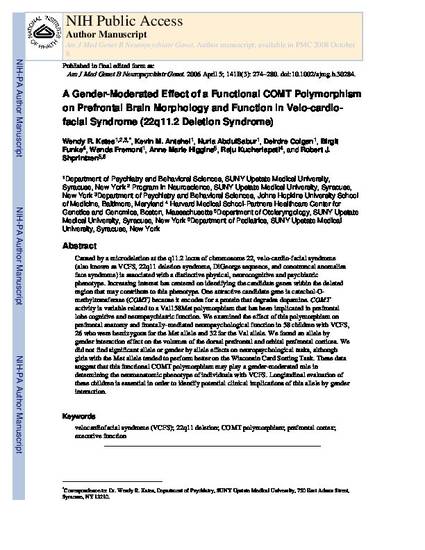
Caused by a microdeletion at the q11.2 locus of chromosome 22, velo-cardio-facial syndrome (also known as VCFS, 22q11 deletion syndrome, DiGeorge sequence, and conotruncal anomalies face syndrome) is associated with a distinctive physical, neurocognitive, and psychiatric phenotype. Increasing interest has centered on identifying the candidate genes within the deleted region that may contribute to this phenotype. One attractive candidate gene is catechol-O-methyltransferase (COMT) because it encodes for a protein that degrades dopamine. Variability in COMT activity is related to a Val158Met polymorphism that has been implicated in prefrontal lobe cognitive and neuropsychiatric function. We examined the effect of this polymorphism on prefrontal anatomy and frontally-mediated neuropsychological function in 58 children with VCFS, 26 who were hemizygous for the Met allele and 32 for the Val allele. We found an allele by gender interaction effect on the volumes of the dorsal prefrontal and orbital prefrontal cortices. We did not find significant allele or gender by allele effects on neuropsychological tasks, although girls with the Met allele tended to perform better on the Wisconsin card sorting task. These data suggest that this functional COMT polymorphism may play a gender-moderated role in determining the neuroanatomic phenotype of individuals with VCFS. Longitudinal evaluation of these children is essential in order to identify potential clinical implications of this allele by gender interaction.

Published: Kates, Wendy R. et al. "A Gender-Moderated Effect of a Functional COMT Polymorphism on Prefrontal Brain Morphology and Function in Velo-Cardio-Facial Syndrome (22q11.2 Deletion Syndrome)." American Journal of Medical Genetics Part B 141B.3 (2006): 274-280.
At the time of publication, Robert J. Shprintzen was affiliated with SUNY Upstate Medical University.